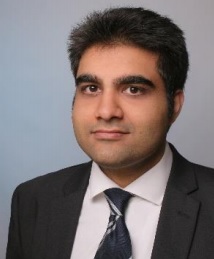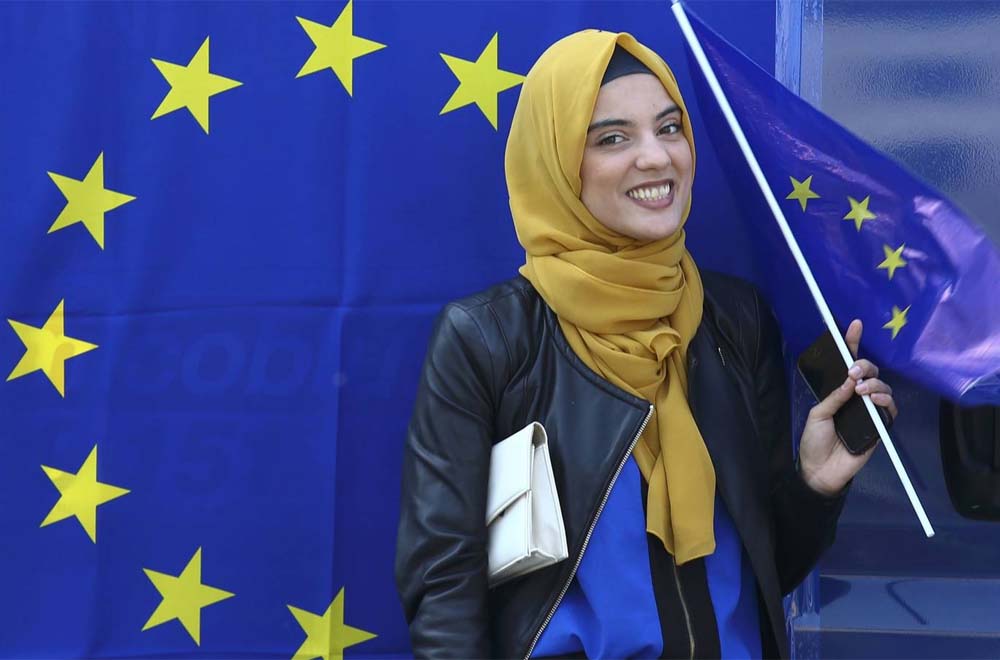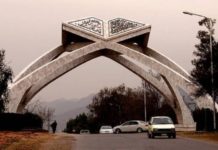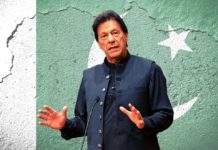Disclaimer: The Eqbal Ahmad Centre for Public Education (EACPE) encourages critical and independent thinking and believes in a free expression of one’s opinion. However, the views expressed in contributed articles are solely those of their respective authors and do not necessarily reflect the position or policy of the EACPE.
A European Islam
Why do we need a European Islam? Why can’t the Muslim be more like Chinese, Hindu, Sikh and Buddhist migrants and assimilate easily in the wider culture? There are some reasons for it. Abrahamic religions tend to be more organized, have few revealed books and trace their origin back to Prophet Abraham and few other prophets. Unlike Dharmic (Hinduism, Buddhism, Jainism, Sikhism) and Eastern religions (Taoism, Japanese Shintoism, Chinese folk religions) Abrahamic religions have founders or messenger and tend to be more conservative in their outlook on life. They give their followers a single-minded focus on one omnipotent God, put more restrictions on their followers, like fasting, praying, ritually slaughtered meat, fixed rituals, prohibition of pre-marital sex etc., than other cosmological and polytheistic religions. Moreover, some rigid social norms tend to get justified in the name of Islam by Muslim cultures. Those norms, if imported and practiced in Europe, can lead to societal conflicts. As a group Muslims tend to be similar to Jews, who lived in Christian and Muslim lands for many centuries without ever giving up their identity and religious conservatism. There is no central religious authority in Islam to interpret the religion for its followers, and unlike the Christian world Muslim cultures didn’t have to go through the process of secularization.
The idea is to develop new interpretations of Islamic law and theology which will be in line with European culture and intellectual tradition. According to some European Muslim scholars this new branch of Islam will be a new cultural off shoot (just like South Asian Islam, South East Asian, Persian Islam). This will help to thwart Islamism and other extremist ideologies from Middle East, and if this new tradition was to take root as another authentic expression of Muslim faith, then European Muslims will stop looking towards traditional Islamic interpretations for guidance. This form of Islam will be closer to European values of enlightenment, rule of law, democracy, separation of church and state, equal rights women and tolerance of other religions.
Europe is a supranational entity of small nation states, where each state has its own distinct culture, language(s) and tradition. That is why a uniform and monolithic European Islam will not be possible. Nonetheless, it somehow has to confirm to core European cultural values. In general, two kinds of dichotomies can emerge: A watered-down or liberal version of Islam, which will accept secular European values, with the end goal being complete assimilation of Muslims in secular European societies. Whereas the conservative Islamic scholars want Muslims to retain basic Islamic ethics and teachings, propose complete linguistic and cultural integration but at the same time do not want complete assimilation in secular lifestyle. What kind of shape European Islam will take in coming decades is hard to predict for now, but the process is already underway.
The Muslim Responsibility
It is in Europe, and not in North America, where most of the stories of ‘lack of Muslim integration’ emerge. Why would that be? These reports are certainly true for a section of Muslim population, but not for all. Some of the blame can be put on the lack of integration policies from previous European governments and narrow assimilation expectations of host cultures. But the glaring lack of integration for a section of European Muslims, and their insistence on archaic Sharia laws and Burqas, begs for more explanation. One must address the issue of why some Muslim groups had more difficulty in adapting to a secular environment than non-Muslim migrants. Britain is an example where the state had to tolerate the presence of Sharia courts for non-binding consultation among British Muslims.
One of the main reasons of such problems can be the low levels of education among previous generations of Muslim migrants. Most post WW-II Muslim migrants were less educated compared to the native population. They were employed in low paid and hard labor sectors which required intense physical work. These first- and second-generation Muslim migrants didn’t tend to be overtly religious. Third industrial revolution in 1970s, made possible by advances in control systems and robotics, automated many of the manual jobs. Closing of coal mines and off shoring of heavy industry made many working-class people jobless. A lot of working communities were not able to recover from this downturn for many decades. The worst effected were the Turkish and Arab migrants and their offspring. At the same time the Islamist insurgencies of Wahabi-Salafi Islam, Muslim Brotherhood and the global Jihad movement against Communism, sponsored by some Western powers, were rearing their ugly head. These movements made inroads in Europe and gave very simplistic solutions of complex socio-economic problems. Economically weak Muslims were told by Islamist ideologues that if they accept the narrow theological and cultural interpretations of conservative Islam then most of their problems will be solved, which lead to the ghettoization of Muslim minds.
Turkey, Saudi Arabia, Iran, and other Arab states vied for influence among European Muslims and sponsored their places of worship. Western countries allowed Imams and religion teachers from these countries in good faith, so that Muslims get the required religious education. However, these very imams became a hinderance towards Muslim community’s integration in their host societies. Their interpretation of Islam was very narrow and according to the social norms of societies from which they were imported. That led to conflict with European societies. Such mosques and institutes use native languages of their financier countries (Urdu-Hindi, Turkish, Arabic) and are located in working class areas.
During Middle Ages Muslim societies developed a tradition of non-democratic dynastical rule (Caliph, Sultan, Padishah). These tyrants had to legitimize their rule and misdeeds via religious decrees, which were readily provided by court Mullahs. Also developed and implemented was the concept of Taqlid (blind following). Those undemocratic, anti-woman and anti-rationality religio-political decrees and works of Islamic jurisprudence are still part of Muslim religious thought. Many semi-literate Muslims around the world have been brainwashed by their political and religious power centers into thinking that authoritarian rulers and bigoted interpretations of Islam are justified. For them Sharia means blind following of any power-hungry Islamic scholar and development of an unquestioning mindset when it comes to challenging the authoritarian rulers. With the rise of nationalism in Muslim majority cultures this Islamist myth became common that it is the duty of a Muslims to live in a Sharia complaint state or to establish a Caliphate. This mindset was imported to Europe by mosques and Islamic institutions sponsored by several Arab states. Radical Islamist insurgencies of such kind should have no place in Europe, and European Islam will help in this regard.
Islam does not call for the establishment of an ‘Islamic State’ or implementation of Sharia by political means. It does not even talk about having a state, and mostly concerns itself with the spirituality of an individual. It gives believers few personal laws which one can practice in any day and age, in any place and culture, with or without the presence of state. The oldest secular empires are Chinese in origin and not Western. Muslim presence in China is almost as old as Islam and yet Muslims managed to successfully integrate and assimilate themselves in Chinese societies. The greatest Indian Muslim empires, the Delhi Sultanate and Mughal Empire, had many secular elements incorporated in their governance. Hence, there is nothing contradictory about being a Muslim and living in a secular Western state.
Arab and Persianate empires always had secular laws for many areas of life (in Persiantes it was called Qanoon), along with Sharia law (which actually governs only a few things). But in the last few centuries due to decline of higher culture, intellectual tradition, and rise of nationalism and nation-states the tolerance of minorities, spirit of innovation and acceptance of secular laws declined. A religious world view started to dominate the Muslim world, according to which every law had to come from the Quran and Islamic jurisprudence. Migrants from these cultures brought such obsolete ideas with them. This section of European Muslim population wears Islam on their sleeves, these are labor migrants or sons of labor migrants who are badly equipped to better integrate into European societies because of their socio-economic condition.
A section of Western press is focused on Islamizing these social problems. According to this mindset it is not the Muslim individual, with a particular socio-economic and cultural background, who makes history and acts in certain ways, but it is the religion of Islam which is causing that individual Muslim to behave in a certain way. A Muslim has apparently no free will of his own. A native European is a complex individual who operates according to his free will, but that is not possible in case of a Muslim and it is Islam which must be guiding all of his actions and impulses. For most Europeans past incidents like the Rushdie Affair, were all due to Muslim narrow mindedness but not because of complex geopolitical mechanizations of Iranian, Saudi and Pakistani governments. Islamists ought to represent only themselves and not the whole community, yet they became the poster child of Islam in post 9-11 Europe. Discussion about Islam is done mostly from the prism of national security now. Muslims should engage in dialogue with the wider population on this critical issue.
What also hinders the acceptance and integration of Muslims in a big way is the criminal behavior of a section of underclass of Muslim men. In UK there was a huge scandal which comprised of criminal Muslim men grooming and raping thousands of working-class white girls. For such criminals the justification for such a vile act was the different sexual mores of victims. These women were a fair game for trafficking because they were working class helpless girls. One horror story after another emerged about prevalence of such gangs. No prize for guessing that such news did disservice to the cause of Muslim integration. In Germany there is a huge problem with Turkish, Arabic and Balkan gangs, these criminal men are not practicing Muslims but have Arabic-Persian sounding names and are involved in many illegal activities. In France Muslim men are presented in jails in very high proportions.
In the last few decades Muslim ghettoes emerged in major European cities, few prominent examples are Brussels and Paris. In these ghettoes Islamists found a fertile ground for recruitment among jobless men, who later went on to do violent attacks. Safety of women also became an issue in these neighborhoods. Local governments either ignored or willingly tolerated these problems. This led to wrong kind of tolerance for asocial behavior of residents of these ghettoes. Burqas, Wahabi clothing, long religious beards became common among the zealous residents. These places became kind of anti-melting pots where people were interacting with their surrounding environments for the sake of mobility and commerce but not for people to people interaction and developing a common culture. Tolerance for such lack of integration can cause a right-wing backlash in the society, and the governments can be accused of appeasing the minority population, such scenarios have to avoided. Multiculturalism is fine if it does not become oppressive and dangerous for people around it. Also, to have ethnically heterogenous regions in Europe is a better approach than having pockets of migrant monocultures. Such pockets of different cultures only make sense in traditional migrant societies.
Europe has to understand that its tolerant and multicultural self-image is not entirely correct. There is plenty of societal, job and housing market racism out there. Whites do not tend to feel it, but many other people can. European governments have to become more selective when it comes to choosing the kind of migrants they want to import. Unskilled and criminal migration comes at detriment of the image of already present migrant communities. Angela Merkel’s decision of unchecked refugee migration wrecked havoc in the German society for some years. Europe needs more educated and skilled migration, and less unskilled men who can easily create more social problems. Efforts to Indigenization Islam and Muslim migrants should be the priority for European governments, whereas Muslim migrants must become fluent in native languages and accept secular laws and constitutions.
So, a mixture of lack of education, joblessness caused by automation, rise of Islamist movements in the Muslim world and its spread in Europe in the preceding decades, wrong tolerance policies of the state, lack of linguistic and cultural integration programs, and unchecked criminality among the male migrant milieu caused the failure of assimilation for a section of Muslim migrant population. Blaming host societies for their short comings can only be useful to some extent. The indigenous and new Muslim migrants have to do more. Muslims of Europe have this historic opportunity to develop new Islamic theology and challenge the orthodoxies formed around Islam during last many centuries. They must stop insisting on interpreting their religion in archaic ways and put an end to the use of obsolete medieval commentaries and works of jurisprudence. There is nothing new about interpreting Islam according to new social realities. Muslim migrants and converts in India, China and South East Asia have always done that. But it will take a lot of smart work, imagination and courage to do so. Intellectual and academic tools, as provided by European universities and research centers, are already there. One has to be original enough to take advantage of it. What European Muslims ultimately need is the reconstruction of religious thought, better socio-economic integration, dialogue with non-Muslims and a new and constantly evolving set of cultural norms.
Read the Part 1 here.
Hassan Mirza
 The writer is working as an applied scientist in Germany and specialises in Computer Simulations, Applied Artificial Intelligence, and Energy Modelling. In his free time he reads extensively in multiple languages (Urdu, English and German) and is interested in writing about scientific and socio-economic issues.
The writer is working as an applied scientist in Germany and specialises in Computer Simulations, Applied Artificial Intelligence, and Energy Modelling. In his free time he reads extensively in multiple languages (Urdu, English and German) and is interested in writing about scientific and socio-economic issues.








